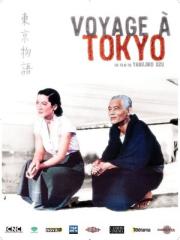 The next film in our Akira Kurosawa Online Film Club is Yasujiro Ozu’s 1953 masterpiece Tokyo Story, a film often considered Ozu’s best and one of the greatest films ever made by anyone.
The next film in our Akira Kurosawa Online Film Club is Yasujiro Ozu’s 1953 masterpiece Tokyo Story, a film often considered Ozu’s best and one of the greatest films ever made by anyone.
Dealing with themes of generational differences, Tokyo Story has a certain thematic connection with our previous film club title, Akira Kurosawa’s Ikiru, and the two films are also near contemporaries, with Kurosawa’s film having been released a little less than a year before Ozu’s. Also some faces should be familiar from last months’ films, most notably Nobuo Nakamura, who played the role of the Deputy Mayor in Ikiru, and now appears as the somewhat more likeable son-in-law in Tokyo Story.
However, more than with Ikiru, Ozu’s film connects with two of his earlier works which we have watched in the last year: the 1949 Late Spring and the 1951 Early Summer. Although not directly related to one another in terms of story, all three films feature Setsuko Hara as a single young woman called Noriko, and they all revolve around similar themes of family and marriage in postwar Japan. All of the three films also feature Chishu Ryu, and many other Ozu regulars appear in at least two out of the three.
David Bordwell’s seminal Ozu and the Poetics of Cinema offers a somewhat longer and more detailed introduction to the film than I will give here. You can (and should!) download the entire book for free as a pdf file from the Center for Japanese Studies. It is a little over 400 megabytes, but definitely worth the download.
For the availability of the film, see the film club schedule. While there, you will also notice that our next month’s film club feature will be Seven Samurai. For the availability of that one, depending on your setup check out the Kurosawa DVD guide or the Kurosawa blu-rays.






I must say that when I watched Tokyo Story last week, I was a little surprised about my reaction, which was unexpectedly subdued. Frankly, I remember having enjoyed the film more when I last saw it.
I don’t know why I had this reaction now. Maybe because I had just seen and been moved by Ikiru, and it was too soon to watch Tokyo Story?
Or maybe I expected to much, having seen so many excellent Ozu films in the last year and remembering Tokyo Story to be one of my favourites. When I compare them now, I feel that I prefer the other two films in the Noriko trilogy over Tokyo Story. Somehow they felt more rounded, more relevant, less artificial.
I wonder too whether the image quality had something to do with it. Of the three Noriko films in BFI’s dvd+bluray series, Tokyo Story has easily the worst picture quality. If I remember correctly, the original negatives were destroyed, so that might explain why.
I’m not saying that watching Tokyo Story was a bad experience. Far from it! It is a beautiful film. But it didn’t leave me with a similar sense of awe or the same number of questions as for instance Ikiru and Early Summer have in recent months.
I would be very curious to hear your reactions, as you too are watching it within the context of films like Early Summer or Ikiru.